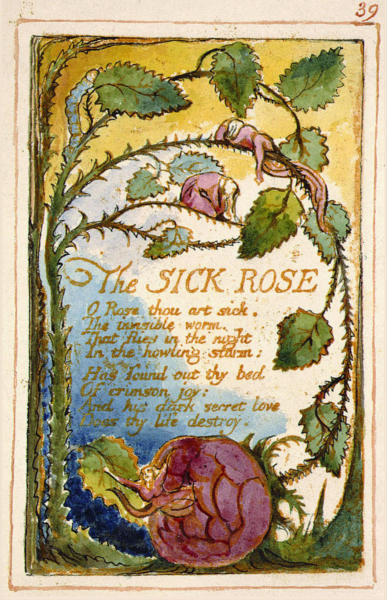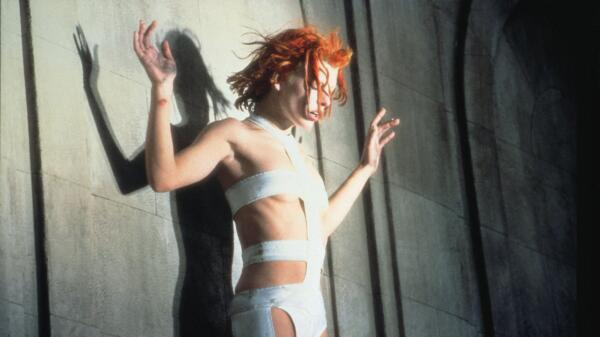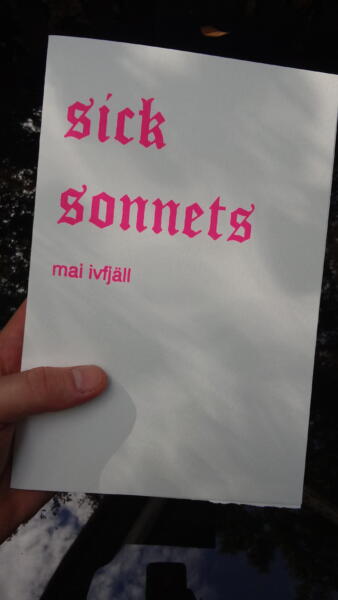“adblock all the art bros of the anthropocene
that are having emotional responses
to the end of nature my body falls apart with the moon
but this isn’t a period poem it’s a poem period”
-from Sick Sonnets
Paul Cunningham: I first read some of your “sick” sonnets in an issue of Burning House Press that Johannes guest edited. I was obviously ecstatic when I came across your submission and Jake and I are so excited to be publishing Sick Sonnets this fall:
the bees are dying — can you feel it? i want
to press my tongue gently against green mesh i want
to bite softly into a sponge of any color i want
to rip & chew & spit that sponge bit out of my mouth
when it becomes small & hard & no longer satisfying the rose
is a rat the rat is a rose
saturn is rising in the 8 the house
I feel like we (humans) have been sick for a while. Even before this pandemic. It seems like the threat posed by climate change really didn’t sink in for a lot of people until global spectacles like Greta Thurberg. Now I think you do see a lot of “art bros” re-branding themselves as ecological artists, eco-poets, etc. Caring about the environment suddenly feels very in-vogue. A lot of poets have their one-off obligatory climate change poem and it sometimes feels disingenuous, performative. There also seems to be this unspoken rule: that ecological art must be optimistic, positive, pleasant, etc. I don’t feel that way when I read your poems though. They feel critical, urgent. The bees, for example, are dying. Personally, I need poems that can help me manage my emotions in the Anthropocene, not ones that promise me that everything is going to be OK. I think that Björk quote finally makes sense to me – “You shouldn’t let poets lie to you.”
Mai Ivfjäll: I wonder if pleasant eco-art is an American thing? In Sweden, a lot of the ecological art I have seen is very dystopian — it’s usually done in a way that makes me want to roll my eyes forever. I’m not sure if these sonnets can be called utopian but they are a kind of love letter to the obliteration of self (and attunement to the present moment) that happens in the throes of chronic sickness. I haven’t figured out how to verbalize it, yet, but I think that those kinds of experiences might be catalysts for new ways of relating to nature.
PC: How would you describe your “sick” sonnets? What makes them sick?
MI: Early on in my autoimmune disease*, I fell into an internet wormhole and came across the phrase le sinthome. Lacan (according to Wikipedia, so no clue how true this is) defined it as “what allows one to live by providing a unique organization of jouissance.” That definition impregnated me with the idea of writing from the perspective of William Blake’s sick Rose:

The sonnets are sick in the sense that they have the body of a traditional sonnet (though there is one that leaks across several pages) but inside they are a mess. The sonnets are infected, inflamed, gorging on language, high on codeine, and totally bored. They are divided between pages because I want them to be accessible to people experiencing brain fog, fatigue, and other mental states that can make reading poetry difficult.
PC: Do you see a relationship between the Anthropocene and the Abject?
MI: This is a question I’m trying to answer through poetry.
PC: “i inject myself with aether until i become the fifth element leeloo / leeloo googling a new vocabulary” I realize she is a character in The Fifth Element, but what is “Leeloo” for you? A divine light?
MI: Is it possible for anyone that was a kid, in America, in the 90’s, to hear the phrase “the fifth element” and not think Leeloo? It would feel dishonest to write a poem about aether and not reference her in some way.
William Gibson said, “The future is already here it is just isn’t evenly distributed.” Sick and disabled people are living in a sci-fi world that ables can’t even fathom. Anyone that has undergone diagnostic testing has been in countless rooms that feel like sets from 2001: A Space Odyssey and Gattaca. So, Leeloo is also a way of bringing a retrofuture vibe to the poem.
The line you mentioned was born in a Swedish poem called Bröllopsdag.
jag tar på mig rymden
injicerar mig med eter
äter stjärnstoff
………….och tungsinne
I’m a little ashamed by how pretty the Swedish poem is —it was written during a time when my body felt monstrous and I was trying to re-shape reality through language.

The Fifth Element (1997) Directed by Luc Besson
PC: I keep picking up on traces of the divine in these sonnets. Pain is also described as a “psalm” (a poetic form known for being communal, personal, and simplistic in style) and the speaker’s “cunt” contains a “canticle”. Is “Leeloo” also a connection to you being a bilingual writer?
MI: I wonder if the flavor of language is something that bilingual speakers experience more acutely than people who only speak one language? I liked the way the sounds tasted in my mouth and wanted others to experience that pleasure.
PC: Do you ever think something in Swedish and have difficulty rendering it into English?
MI: I’m not often in a situations where I think in Swedish and then speak in English. If I’m speaking Swedish then I’m also thinking in Swedish and if I’m speaking English then I’m thinking in English. I never translate. When I’m writing, I try to write in each language in a way that I couldn’t write in the other one. I may start with the same idea but then I follow the logic of each language until a poem is formed.
PC: How does the occult figure into your poetics?
MI: I’m a sucker for the language of magick and devotion. I was raised in the neo-charismatic christian movement and started speaking in tongues when I was three. I trained in spiritual warfare as a child, practiced prophesy, and witnessed exorcisms. So my way of rebelling was to ravenously read any occult book I could get my hands on (Aleister Crowley, George Gurdjieff, Timothy Leary, etc.) and move to the most secular country I could find. These days, I’m more interested in mysticism but there are a lot of easter eggs in my poems for readers with occult knowledge.
PC: What is Hekseskolen?
MI: Hekseskolen is a group of evil twins brought together by the poets Olga Ravn and Johanne Lykke Holm. It started as a writing workshop but now it is more of a performance group. It’s also a way of being in literature. To quote Norman Mailer, it’s about writing that is “always fey, old-hat, Quaintsy Goysey, tiny, too dykily psychotic, crippled, creepish, fashionable, frigid, outer-Baroque, maquillé in mannequin’s whimsy, or else bright and still born.”
PC: What are you currently reading? Who are some of your influences?
MI: I’m always reading and re-reading Hiromi Itō, Madeline Gins, Clarice Lispecter, Kim Hyesoon, Fleur Jaeggy, Ingeborg Bachmann, Inger Christensen, and the Hekseskolen writers. Two of my favorite poets that haven’t written a book yet are Precious Okoyomon and Clara Olausson.
*Mixed connective tissue disease and polymyositis
Mai Ivjfäll is a bilingual sick poet based in Stockholm and Atlanta. She is author of the chapbooks Sick Sonnets (forthcoming from Radioactive Cloud), Into Longing Vast Rose (If a Leaf Falls Press, UK), Andakt (AFV Press, NO) and Weep Hole (Sad Press, UK). Her poems have appeared in American Chordata, Fanzine, Odiseo, Ordkonst, Tidskriften Provins, Vakxikon’s Greek Anthology of Young Swedish Writers, and elsewhere. @maiivfjaell
Paul Cunningham (b. 1989) is the author of the The House of the Tree of Sores (Schism2 Press, 2020) and The Inmost (Carrion Bloom Books, 2020), and the translator of Helena Österlund’s Words (OOMPH! Press, 2019). He has also translated two chapbooks by Sara Tuss Efrik: Automanias Selected Poems (Goodmorning Menagerie, 2016) and The Night’s Belly (Toad Press, 2016). His creative and critical work has most recently appeared in Snail Trail Press, Apartment Poetry, Kenyon Review, Quarterly West, Poem-a-Day, DIAGRAM, and others. He is a managing editor of Action Books, co-editor of Radioactive Cloud, and co-curator of the Yumfactory Reading Series. He is a PhD candidate at the University of Georgia. @p_cunning
